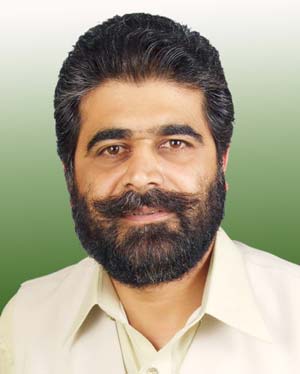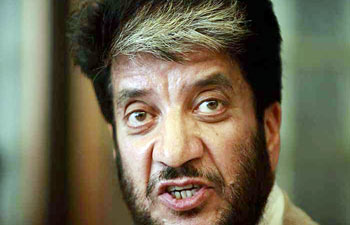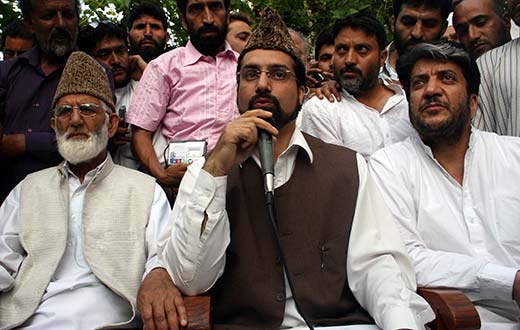Two separatist leaders were released after New Delhi appointed interlocutors to asses the situation in Kashmir. Ilham Hassan found them disappointed with the scenario in the separatist camp.

The first batch of separatist leaders who were released after the arrival of New Delhi appointed interlocutors’ in Kashmir are struggling to make head and tail of the prevailing situation. They admit that the state in the separatist camp is disturbing as well as discouraging. “Most of the separatist leaders are not at talking terms with each other, leave alone the thought of cobbling up an alliance”, said one of the recently-released leaders. “It is hard to make out wherefrom to pick up the threads”, he said.
The state government launched a massive crackdown on separatist leaders and senior workers shortly after the public uprising that triggered following the killing of three youngsters in a fake encounter in Macchil sector of Kupwara in May. Most of them were taken into custody to prevent flare-up. However, the situation could not be prevented from going out of control of the authorities due to the spree of killings by the police and paramilitary Central Reserve Police Force (CRPF). The hardline faction of Hurriyat Conference led by Syed Ali Geelani spearheaded the public uprising that peaked in July and August.
The turnaround in situation came after the arrival of All Party Parliamentary Delegation led by Home Minister P Chidambaram in late September. Following the feedback from the ground level, the Home Minister issued directions to the state government to prevent civilian casualties while dealing with protestors and stone-pelters. The situation began to exhibit signs of improvement and paved way for the Center to launch initiatives to reach out to the disgruntled people.
One such initiative was the appointment of three interlocutors led by senior journalist Dilip Padgaonkar. The interlocutors admitted umpteen times that there was need to bring about perceptible changes on the ground level through Confidence Building Measures. One such CBM, they said, was the release of political prisoners to kickstart process of reconciliation.
After the arrival of interlocutors, two separatist leaders—Democratic Freedom Party chief Shabir Ahmad Shah and National Front chairman Nayeem Ahmad Khan – were released. Shah was initially offered parole in the backdrop of deteriorating health condition of his mother but he refused to accept the conditional release. Later, on November 3, he was released from Kotbalwal jail in Jammu. Shah told Kashmir Life that it was the first time during his jail sojourns stretching almost 27 years that Public Safety Act (PSA) was slapped on him eight times in a row. Shah was arrested in August 2008 after he led a march towards Muzaffarabad to counter the alleged economic blockade of Kashmir Valley. He was briefly released twice but rearrested the last in February this year.
Nayeem Khan was arrested in late July when streets in Kashmir Valley were ruled by agitators and stone-throwers. For three months he remained in Sub Jail Baramulla under police remand followed by a fortnight in Joint Interrogation Center at Humhama. During his detention period, unlike other leaders and workers, Khan was not slapped with PSA. He was held under section 107 of the Ranbir Panel Code. Interestingly, his release was programmed to coincide with the arrival of interlocutors’ team at the Srinagar Central Jail.
“I don’t know whether it was a coincidence or they (authorities) did it deliberately. I met the interlocutors at the jail gate and we chatted for quite some time,” Khan said. He said that Padgaonkar and Radha Kumar were not alien to him. “We have spoken to each other several times in the past. I have participated and spoken in seminars organised by Radha,” Khan said.
Both Shah and Khan have expressed desire to work for the unification of separatist groups, or at least, to forge a working relationship amongst the secessionists. To begin with, Shah and Khan have visited several places, especially families of the victims of recent violence, to express their condolences and exhibit solidarity with them.
Khan and Shah are associated with the moderate faction of Hurriyat Conference led by Mirwaiz Umar Farooq. Shah says that he joined Hurriyat Conference at Martyr’s Graveyard at Eidgah with a pledge that he would work for the unification of separatist groups to take the “resistance movement to its logical end”. “I was punished for this act. One of the main grounds for my detention was that I tried to forge unity between the pro-freedom groups in Kashmir,” he told Kashmir Life at his Rawalpora residence where policemen were deployed to prevent his movement outside.
 Khan has the distinction of working with both factions of Hurriyat Conference. When Geelani parted ways with Mirwaiz in 2003 following differences on response to 2002 assembly elections, Nayeem Khan chose to side with Geelani. However, he felt uncomfortable with Geelani group and returned to Mirwaiz camp when the latter exhibited flexibility to enter into dialogue with Government of India. In 2008 uprising, Khan played a crucial role in forming Coordination Committee, which spearheaded the agitation against allotment of forestland to Amarnath shrine board. Khan and now-detained Geelani aide Masarat Alam were the spokesmen of the Coordination Committee.
Khan has the distinction of working with both factions of Hurriyat Conference. When Geelani parted ways with Mirwaiz in 2003 following differences on response to 2002 assembly elections, Nayeem Khan chose to side with Geelani. However, he felt uncomfortable with Geelani group and returned to Mirwaiz camp when the latter exhibited flexibility to enter into dialogue with Government of India. In 2008 uprising, Khan played a crucial role in forming Coordination Committee, which spearheaded the agitation against allotment of forestland to Amarnath shrine board. Khan and now-detained Geelani aide Masarat Alam were the spokesmen of the Coordination Committee.
Shah wants to start the conciliation process among the separatists anew from the place where he left it in 2008. “There is need of putting the act together. Otherwise we are destined to ruin. We (separatist leaders) are under obligation and debt of the sacrifices of the people.
By singing in different tunes we are dishonouring their commitment and sacrifices”, he said. Shah lamented that both his initiatives – to forge alliance among the separatist leaders and to take the Hurriyat Conference to grassroots level – were aborted by the leadership. “I had initiated opening of district offices of the Hurriyat but after my detention, the offices have been closed down. The organisational structure of the amalgam has been suspended except for the post of chairman,” he said.
Shah said that he was able to bring together Mirwaiz and Geelani in June 2008 under an agreement to restore 1993-Constitution of the Hurriyat Conference. “I will try to refresh my efforts in that direction,” he said.
Sources said that Khan and Shah have decided to coordinate their efforts to streamline the separatist activities. “We are both in the same (Mirwaiz) group. Nayeem Sahib is heading his own party. We have visited several places together. This is good but there is no room for making any third front,” Shah said.

Interestingly, Khan and Shah have the same origin in People’s League, one of the most prominent separatist organisations in Kashmir. Khan shot into prominence when he was arrested along-with Shabir Shah in 1990 at Botengoo in south Kashmir’s Islamabad district. There was unprecedented strike for two weeks in Kashmir on the duo’s arrest and several casualties took place during protests.
However, the two friends did not carry along well. In 1998, they washed dirty linen in public when they accused each other of misappropriation of funds and public donations. Khan and his associates forcibly took over a house in uptown Srinagar, which was owned by Shah. In reaction, Shah announced to float a public trust and decided to dedicate Rs 2 crore for public donations. Khan said that the donated amount was just a fraction of money Shah was accounted for.
But, twelve years down the line, the hatchet has healed up. Both leaders are well-settled in their own groups with distinct identities. Observers say that there is hardly any room for the merger of the groups but there is scope for forging alliances, leaving behind old rivalries and misgivings.

Mirwaiz Umar Farooq had proposed merger of various groups, which was to be followed by shaping Hurriyat Conference into a party rather than an alliance, but the idea was disliked by most of the constituent parties in his amalgam.
“There should be the unification of hearts rather than the groups and individuals. This is my childhood dream to see resistance leaders together for a common cause. I will try my level best to restart the process,” Shah said. “There can be reservations but they can be cleared when the leaders decide to talk to each other,” he said while offering his role to clear the mistrust.
Shah and Khan share the opinion that the recent uprising threw a golden opportunity for the “resistance leadership to act together”. “The public has invested to the best of their capability. It is the leadership that failed the people,” Nayeem said.
“It is because of the disarray in pro-freedom leadership that state repression is increasing day by day. The youngsters are being arrested and lodged in jails. Police officers are earning ransom for releasing beleaguered youth,” Shah said. “This situation can be prevented only when our leadership gets together,” he said. This is the high time when pro-freedom leadership should think in coordination to forge a strategy to prevent state repression and pave way for the dialogue process to see the Kashmir issue resolved, Shah declared.















